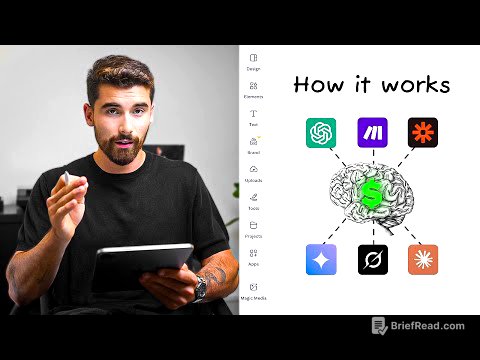TLDR;
Drew Manning, a fitness trainer, is on his second "Fit to Fat to Fit" experiment, gaining weight to raise awareness about the mental and emotional aspects of weight loss and the lack of empathy in the fitness industry. He's tracking his body's physiological changes with WHOOP to show how an unhealthy lifestyle affects mental, emotional, and physical health. He aims to help people understand the importance of addressing these aspects for successful weight loss transformation.
- Manning gained 75 pounds in his first experiment, realizing the emotional connection to food and the need for empathy in helping people with weight loss.
- He's now tracking data like blood glucose levels, sleep, memory, and sexual health to demonstrate the impact of an unhealthy lifestyle on various aspects of life.
- He's inviting people to join him on his journey back to fitness, focusing on physical, mental, and emotional aspects of weight loss transformation.
The Fit to Fat to Fit Experiment
Manning describes his first "Fit to Fat to Fit" experiment, where he intentionally gained weight for six months by consuming a diet of processed foods and avoiding exercise. He gained 75 pounds and discovered the emotional connection to food, realizing that willpower and discipline alone weren't enough for weight loss. He also learned the importance of empathy and understanding the mental and emotional struggles people face when trying to lose weight. This experience led him to write his first book, "Fit2Fat2Fit," which became a New York Times bestseller, and create a TV show on A&E with the same name.
Doing It All Over Again
Manning explains his second "Fit to Fat to Fit" experiment, which focuses on spreading the message of empathy in the fitness industry. He believes the industry lacks empathy and aims to bring awareness to the importance of the mental and emotional aspects of transformation. He's also turning 40 this year and wants to show people that it's possible to take care of their health even as they age. This time, he's tracking more data, including blood glucose levels, sleep, memory, and sexual health, to demonstrate the impact of an unhealthy lifestyle on various aspects of life.
Data Insights From the First Part of My Journey: HRV, Resting Heart Rate & More
Manning shares his observations from the first part of his weight gain journey, focusing on the impact on his sleep and recovery, as measured by WHOOP. He noticed a significant decrease in his recovery scores and HRV, highlighting the negative impact of weight gain on these metrics. He explains how this data can help people understand how an unhealthy lifestyle affects their mental and emotional capacity to handle stress, leading to increased reactivity, mood swings, and hormonal imbalances.
The Road Back
Manning invites people to join him on his journey back to fitness, starting January 4, 2021. He emphasizes the importance of addressing the physical, mental, and emotional aspects of weight loss transformation. He encourages people to follow along at fit2fat2forty.com or on social media at @fit2fat2fit.








